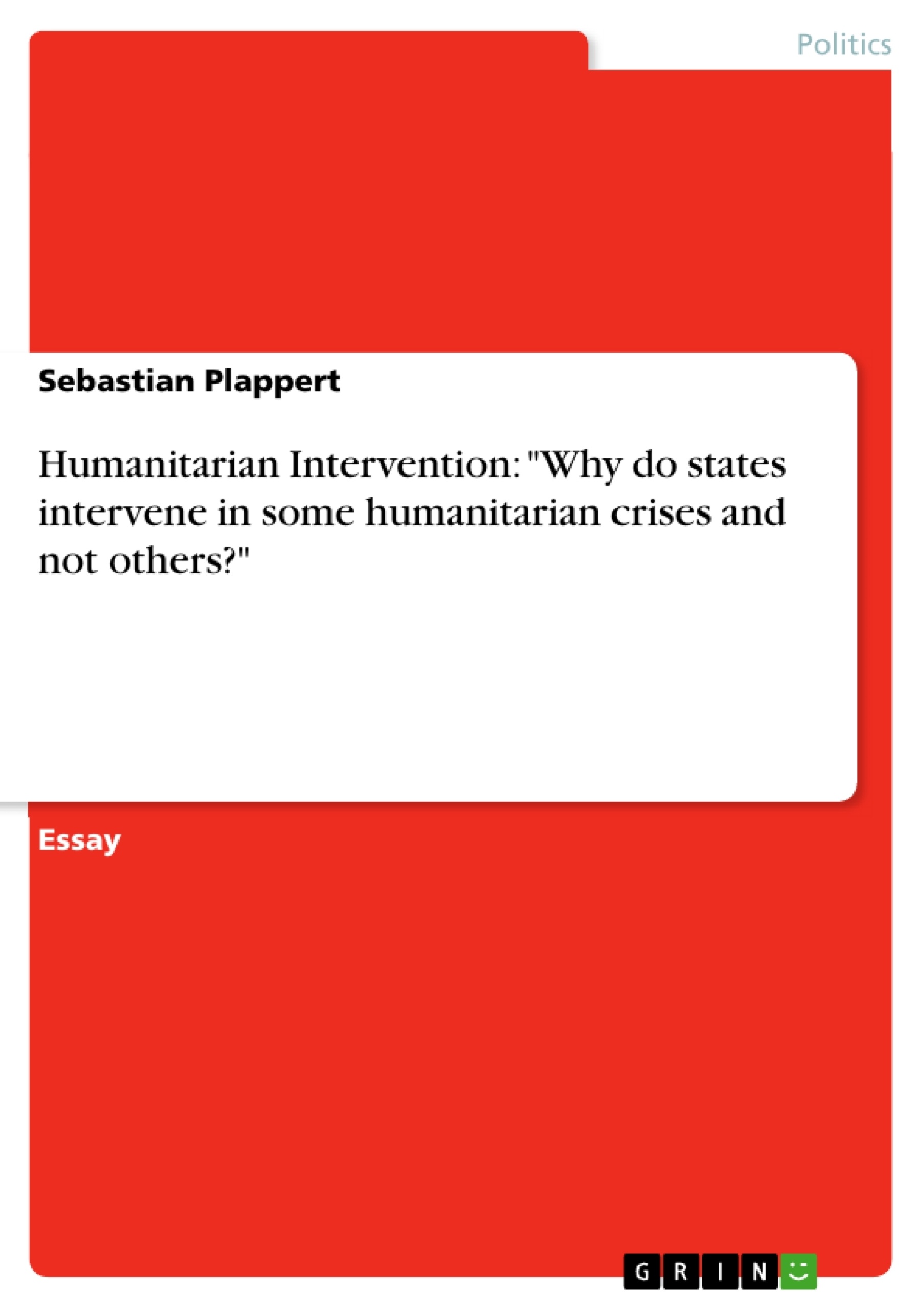This paper will argue, that the decision to intervene or not, depends on political will to do so, which itself derives from a correlation between anticipated costs and benefits. Intervention will occur only when, under consideration of all factors, the benefits outweigh the costs. After a brief review of cold war conditions, this essay will concentrate on key factors, which influence political will for humanitarian intervention in the post cold war era. All factors will be considered by supportive cases compared to Rwanda as an example for lacking political will.
Inhaltsverzeichnis (Table of Contents)
- Introduction
- The Cold War Era
- Post Cold War Conditions
- Outlook of Success
- Timeframe and Size of an Operation
- Relationship and Self-Conception of States
- Perception of a Crisis as a Humanitarian Disaster
- Conclusion
Zielsetzung und Themenschwerpunkte (Objectives and Key Themes)
This paper investigates the factors that influence states’ decisions to intervene in humanitarian crises. By examining the historical context of the Cold War and the post-Cold War era, the paper analyzes the political considerations behind humanitarian intervention. It explores the role of anticipated costs and benefits, emphasizing the crucial importance of political will in determining the outcome of these interventions.
- Political will to intervene
- Cost-benefit calculations
- Factors influencing political will: outlook of success, timeframe, state relationships, perception of crisis
- Historical context and the impact of the Cold War and its aftermath
- Examples of humanitarian interventions and their outcomes
Zusammenfassung der Kapitel (Chapter Summaries)
The paper begins by examining the historical context of humanitarian intervention during the Cold War era. It argues that geo-strategic considerations outweighed humanitarian concerns during this period, highlighting the role of power dynamics between the USSR and the USA. It analyzes specific cases, including the Vietnam intervention in Cambodia and the Tanzanian invasion of Uganda, to illustrate this point.
The paper then transitions to the post-Cold War era, where it identifies several key factors that influence states' decisions to intervene in humanitarian crises. These factors include the perceived outlook of success, the expected timeframe and size of the operation, the relationship and self-conception of states, and the perception of a crisis as a humanitarian disaster. It examines specific examples, such as the interventions in Iraq (1991) and Haiti (1994), to demonstrate the role of these factors in shaping political will.
The paper also explores the contrasting example of Rwanda, where the lack of political will, driven by a combination of factors such as the perceived high risk of failure and the negative historical experiences in Somalia, resulted in a failure to intervene. It further highlights the importance of UN authorization in legitimizing humanitarian interventions.
Schlüsselwörter (Keywords)
This paper examines the political considerations surrounding humanitarian intervention, highlighting key terms such as political will, cost-benefit analysis, outlook of success, timeframe, state relationships, perception of crisis, and the role of the United Nations in authorizing and implementing humanitarian interventions. It utilizes case studies such as the interventions in Iraq, Haiti, Rwanda, and Somalia to illustrate its findings.
Frequently Asked Questions
Why do states choose to intervene in some humanitarian crises but not others?
The decision depends primarily on political will, which is driven by a cost-benefit analysis. States intervene when the anticipated benefits outweigh the political, economic, and military costs.
How did the Cold War influence humanitarian intervention?
During the Cold War, geo-strategic interests and power dynamics between the USA and USSR usually took precedence over humanitarian concerns, often blocking interventions unless they served strategic goals.
What are the key factors influencing political will in the post-Cold War era?
Key factors include the outlook of success, the expected timeframe and size of the operation, the relationship between the states involved, and how the crisis is perceived by the public and leaders.
Why was there a failure to intervene in the Rwandan genocide?
The lack of intervention in Rwanda was due to a lack of political will, influenced by the perceived high risk of failure and negative memories of the failed intervention in Somalia shortly before.
What role does the UN play in humanitarian interventions?
UN authorization is crucial for the international legitimacy of an intervention, though the paper notes that political interests of member states often determine whether such authorization is granted.
- Quote paper
- MIR, MA Sebastian Plappert (Author), 2007, Humanitarian Intervention: "Why do states intervene in some humanitarian crises and not others?", Munich, GRIN Verlag, https://www.grin.com/document/153935



